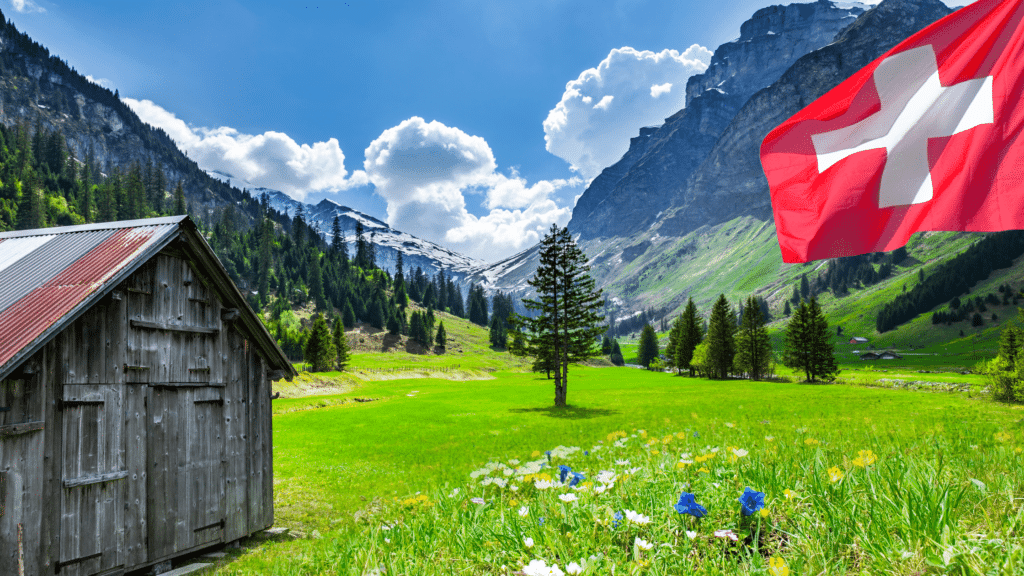
Things to Know about Swiss Culture Before Traveling to Switzerland
Whether you’re planning to vacation in Switzerland, to do business there, or to study abroad, it’s good to arrive with some knowledge of what Swiss culture and what the Swiss people are really like. You probably already know that Switzerland is known for its beautiful mountains, cheese, chocolate, cows, and watches. But beyond these cliches, what really makes Swiss people tick?
 The Swiss live in an amazing country that has had a major impact on their culture and character. Switzerland is a small, landlocked country, geographically in central Europe, and bordered by Germany, Lichtenstein, Austria, France, and Italy. The languages of these countries–German, French, and Italian–became the languages of the Swiss regions bordering them. There is also an eastern part of Switzerland, the only place in the world where a fourth language, Romansh, is spoken. The people of Switzerland thus became diverse and multilingual. Most Swiss people speak at least two languages, and many speak even more. English is taught as a second or third language in schools and has in many instances become the language of business.
The Swiss live in an amazing country that has had a major impact on their culture and character. Switzerland is a small, landlocked country, geographically in central Europe, and bordered by Germany, Lichtenstein, Austria, France, and Italy. The languages of these countries–German, French, and Italian–became the languages of the Swiss regions bordering them. There is also an eastern part of Switzerland, the only place in the world where a fourth language, Romansh, is spoken. The people of Switzerland thus became diverse and multilingual. Most Swiss people speak at least two languages, and many speak even more. English is taught as a second or third language in schools and has in many instances become the language of business.
 Another major influence of the country on its people is its beautiful natural environment. Enjoying the outdoors is at the heart of the Swiss. They love all kinds of outdoor activities, from sports like soccer and tennis to mountain biking and skiing, and for the most adventurous. mountain climbing and paragliding around the alps. However, the top outdoor activity enjoyed by the Swiss is hiking. Families hike together on weekends as do young and old friends. Seniors who have skied, hiked, and walked all their lives are fit and may well go past you up a mountain trail!
Another major influence of the country on its people is its beautiful natural environment. Enjoying the outdoors is at the heart of the Swiss. They love all kinds of outdoor activities, from sports like soccer and tennis to mountain biking and skiing, and for the most adventurous. mountain climbing and paragliding around the alps. However, the top outdoor activity enjoyed by the Swiss is hiking. Families hike together on weekends as do young and old friends. Seniors who have skied, hiked, and walked all their lives are fit and may well go past you up a mountain trail!
 Together with the influence of this beautiful country cradled within high alpine ranges, Swiss identity and character were also shaped by Swiss history and politics. Historically, Switzerland has been a confederacy of states, sharing the values of federalism and direct democracy, whereby the people themselves, rather than their representatives, decide on legislative policies. Thus, Swiss identity “transcends language, ethnicity, and religion, (which) has led to Switzerland being described as a Willensnation (“nation of volition”) rather than a nation-state” (Wiki) While opinions and votes may vary, traditionally the motto of Switzerland has been ‘All for one and one for all.”
Together with the influence of this beautiful country cradled within high alpine ranges, Swiss identity and character were also shaped by Swiss history and politics. Historically, Switzerland has been a confederacy of states, sharing the values of federalism and direct democracy, whereby the people themselves, rather than their representatives, decide on legislative policies. Thus, Swiss identity “transcends language, ethnicity, and religion, (which) has led to Switzerland being described as a Willensnation (“nation of volition”) rather than a nation-state” (Wiki) While opinions and votes may vary, traditionally the motto of Switzerland has been ‘All for one and one for all.”
 As such, Swiss people value tolerance, trust, diversity within mutuality, and political neutrality. They are respectful and law-abiding. As a nation and individually they like to be in touch with people from different parts of the world. As a neutral country Switzerland has often mediated with nations in conflict. The Swiss are ready to protect their country and each other, just as they protect their beautiful natural environment, including their animals. Think of all the Swiss cows with their lovely cowbells that offer a constant musical background to pastural scenes. There are also strong laws and regulations regarding animal protection. For example, animal cruelty is not tolerated. It is thus illegal to keep “social” animals, such as pigs, goats, guinea pigs, parrots, ferrets, fish, and others unless they are a pair.
As such, Swiss people value tolerance, trust, diversity within mutuality, and political neutrality. They are respectful and law-abiding. As a nation and individually they like to be in touch with people from different parts of the world. As a neutral country Switzerland has often mediated with nations in conflict. The Swiss are ready to protect their country and each other, just as they protect their beautiful natural environment, including their animals. Think of all the Swiss cows with their lovely cowbells that offer a constant musical background to pastural scenes. There are also strong laws and regulations regarding animal protection. For example, animal cruelty is not tolerated. It is thus illegal to keep “social” animals, such as pigs, goats, guinea pigs, parrots, ferrets, fish, and others unless they are a pair.
 In their private lives, family is very important to Swiss people. Statistically each family has 2.4 children. Mothers of young children either stay at home with them or work part-time, with grandparents often handling childcare as needed. Family members are thrifty from an early age on. The Swiss also value honesty, hard work, organization, and cleanliness. A custom you may not be familiar with is taking ones shoes off inside home. When visiting Swiss people at home, it’s polite to ask if you should take your shoes off. You will most likely be asked to do so, but a pair of slippers will usually be offered for you to wear. When invited to dinner, it’s polite (and expected) that you bring a small gift such as flowers (uneven numbers if it’s just a few stems), chocolate or a gift for the children. Before beginning a delicious meal of Swiss cuisine, say “Guten Appetit” in the German part or “bon appétit” in the French part or “buon appetito” in the Italian part. When offered a glass of wine, wait for the host to make a toast before drinking and with an individual, look the person in the eye while toasting. Not to forget, as a newcomer you are expected to make the first move and invite your neighbors over for a glass of wine and snacks to introduce yourself. In addition to these social expectations be aware of house rules in apartments.
In their private lives, family is very important to Swiss people. Statistically each family has 2.4 children. Mothers of young children either stay at home with them or work part-time, with grandparents often handling childcare as needed. Family members are thrifty from an early age on. The Swiss also value honesty, hard work, organization, and cleanliness. A custom you may not be familiar with is taking ones shoes off inside home. When visiting Swiss people at home, it’s polite to ask if you should take your shoes off. You will most likely be asked to do so, but a pair of slippers will usually be offered for you to wear. When invited to dinner, it’s polite (and expected) that you bring a small gift such as flowers (uneven numbers if it’s just a few stems), chocolate or a gift for the children. Before beginning a delicious meal of Swiss cuisine, say “Guten Appetit” in the German part or “bon appétit” in the French part or “buon appetito” in the Italian part. When offered a glass of wine, wait for the host to make a toast before drinking and with an individual, look the person in the eye while toasting. Not to forget, as a newcomer you are expected to make the first move and invite your neighbors over for a glass of wine and snacks to introduce yourself. In addition to these social expectations be aware of house rules in apartments.
 Finally, a common misperception about the Swiss, especially the German Swiss, is that they are unfriendly. The truth about the polite Swiss people is that they are reserved, and friendships do not happen instantly. Being acquainted with someone does not immediately translate into friendship, but if you are patient, once friendships are established you will find Swiss people to be very good and lasting friends.
Finally, a common misperception about the Swiss, especially the German Swiss, is that they are unfriendly. The truth about the polite Swiss people is that they are reserved, and friendships do not happen instantly. Being acquainted with someone does not immediately translate into friendship, but if you are patient, once friendships are established you will find Swiss people to be very good and lasting friends.

CORE Languages has premier services for intercultural training for businesses. To learn more, click here.





Responses